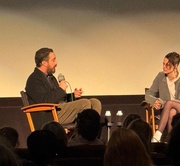HQ
Fan Photos
Click on photos for full view.
Death is not something Chilean filmmaker Pablo Larraín is afraid of. From “Jackie” to “El Conde” and now with his latest feature, “Maria,” Larraín has often explored the effect mortality has on individuals, especially on those with the ability to make an impact on others, never shying away from the mysteries the subject offers, but instead creating heart-rending, often celebratory studies of how certain figures, against all odds, find meaning in their lives. In reference to his loose “Important Women” trilogy, consisting of “Jackie,” “Spencer,” and “Maria,” Larraín sets his lens on three iconoclasts who became icons in their own right, each forced to face death as a result of the structures they inhabited.
Reuniting with his “Spencer” star Kristen Stewart recently for a Q&A following a screening of “Maria” at the American Cinematheque’s Aero Theatre in Santa Monica, Larraín shared what drew him to opera singer Maria Callas in the first place and how her narrative connects to both Jacqueline Kennedy and Diana Spencer, but also stands apart.
Death is not something Chilean filmmaker Pablo Larraín is afraid of. From “Jackie” to “El Conde” and now with his latest feature, “Maria,” Larraín has often explored the effect mortality has on individuals, especially on those with the ability to make an impact on others, never shying away from the mysteries the subject offers, but instead creating heart-rending, often celebratory studies of how certain figures, against all odds, find meaning in their lives. In reference to his loose “Important Women” trilogy, consisting of “Jackie,” “Spencer,” and “Maria,” Larraín sets his lens on three iconoclasts who became icons in their own right, each forced to face death as a result of the structures they inhabited.
Reuniting with his “Spencer” star Kristen Stewart recently for a Q&A following a screening of “Maria” at the American Cinematheque’s Aero Theatre in Santa Monica, Larraín shared what drew him to opera singer Maria Callas in the first place and how her narrative connects to both Jacqueline Kennedy and Diana Spencer, but also stands apart.
“I think Maria Caras was someone that as she was singing she was dying every time. Life was taken from her while she sang and I wondered if that was filmable. Can we shoot that? Can we film that and put it in a movie?” said Larraín. “Can we not only feel her perception through music, but really try to understand that Maria Callas sang eight operas more than 50 times in her life and seven of them were tragedies, so she, the main character, was death. Death was dead in the last scene. So I think she became the sum of the tragedies that she played on stage. So it was someone that circulated tragedy and and we didn’t want to avoid that. We wanted to get into that tragedy and that tragic figure and make a celebration out of it and deal with that and not hide from it.”
Larraín extended a great deal of credit to his star Angelina Jolie for capturing this tragedy and opening herself to “the idea of dying.” Stewart agreed, but felt the music also really helped connect her even when she didn’t always understand it.
Death is not something Chilean filmmaker Pablo Larraín is afraid of. From “Jackie” to “El Conde” and now with his latest feature, “Maria,” Larraín has often explored the effect mortality has on individuals, especially on those with the ability to make an impact on others, never shying away from the mysteries the subject offers, but instead creating heart-rending, often celebratory studies of how certain figures, against all odds, find meaning in their lives. In reference to his loose “Important Women” trilogy, consisting of “Jackie,” “Spencer,” and “Maria,” Larraín sets his lens on three iconoclasts who became icons in their own right, each forced to face death as a result of the structures they inhabited.
Reuniting with his “Spencer” star Kristen Stewart recently for a Q&A following a screening of “Maria” at the American Cinematheque’s Aero Theatre in Santa Monica, Larraín shared what drew him to opera singer Maria Callas in the first place and how her narrative connects to both Jacqueline Kennedy and Diana Spencer, but also stands apart.
“I think Maria Caras was someone that as she was singing she was dying every time. Life was taken from her while she sang and I wondered if that was filmable. Can we shoot that? Can we film that and put it in a movie?” said Larraín. “Can we not only feel her perception through music, but really try to understand that Maria Callas sang eight operas more than 50 times in her life and seven of them were tragedies, so she, the main character, was death. Death was dead in the last scene. So I think she became the sum of the tragedies that she played on stage. So it was someone that circulated tragedy and and we didn’t want to avoid that. We wanted to get into that tragedy and that tragic figure and make a celebration out of it and deal with that and not hide from it.”
Larraín extended a great deal of credit to his star Angelina Jolie for capturing this tragedy and opening herself to “the idea of dying.” Stewart agreed, but felt the music also really helped connect her even when she didn’t always understand it.
“There is ambiguity in the sound of music and in the performance of opera that can cut sharper and quicker than dialogue and plot, I mean it just like permeates,” Stewart said. “There’s something about voiceless articulation that can drop you and you could speak any language, you could speak Spanish, Italian. This movie feels like it endeavors to be an opera and I don’t speak Italian and I’m not an opera aficionado by any means and so like I think that that doesn’t mean that you’re alienated by the form of it and it’s really cool to make a movie for like a normal audience that still endeavors to touch you in that particular way.”
Comparing this effect to “Spencer,” Larraín explained that it had everything to do with how he approaches narrative as something that should be perceived and not necessarily spoon-fed to audiences.
"I think there’s a big limitation in the more rational approach to movies,” he said, “where there’s like a shot and there’s like a shot and there’s like a two shot and there’s like a shot from here, so we know that you’re here, and like a logical narrative of the situation, but I feel that reality is way more complicated.”
Appreciating this sentiment, Stewart added, “It’s so easy to forget that you’re allowed to interact. Sometimes I’m like, I don’t know, hard on myself — well no sometimes I’m like, ‘Well, you’re an idiot.’ You watch the thing and touch it instead of immediately going, ‘What is this about?’ It’s like audiences are the worst. And we’re all the same, it’s just the worst is when you’re always trying to fucking crack the code and just get ahead of the game and you’re like, ‘Why am I trying to race through something that’s being a gift to me?'”
In a way, Stewart felt the strongest impact “Maria” makes and how it stands apart from “Jackie” and “Spencer” is in how it captures artistry and particularly Larrain’s sensibilities as an artist.
'"Maria’ is your first film about an artist in a literal sense, even though I find artistry in Jackie and Diana, the way they inhabited the world,” said Stewart. “Maria literally dies when the art goes and you literally told me yourself no creativity is death and I fully cried watching this movie when she takes her last breaths, not because I know Maria Callas, but because I know you.”
Closing out their chat, Larraín informed Stewart that she would be getting a call soon apropos their next collaboration and that he looked forward to working with her again. He wasn’t exactly sure of the details, but when it comes to art, sometimes the only thing that can get in your way is death itself.























































No comments:
Post a Comment
What do you think of this?